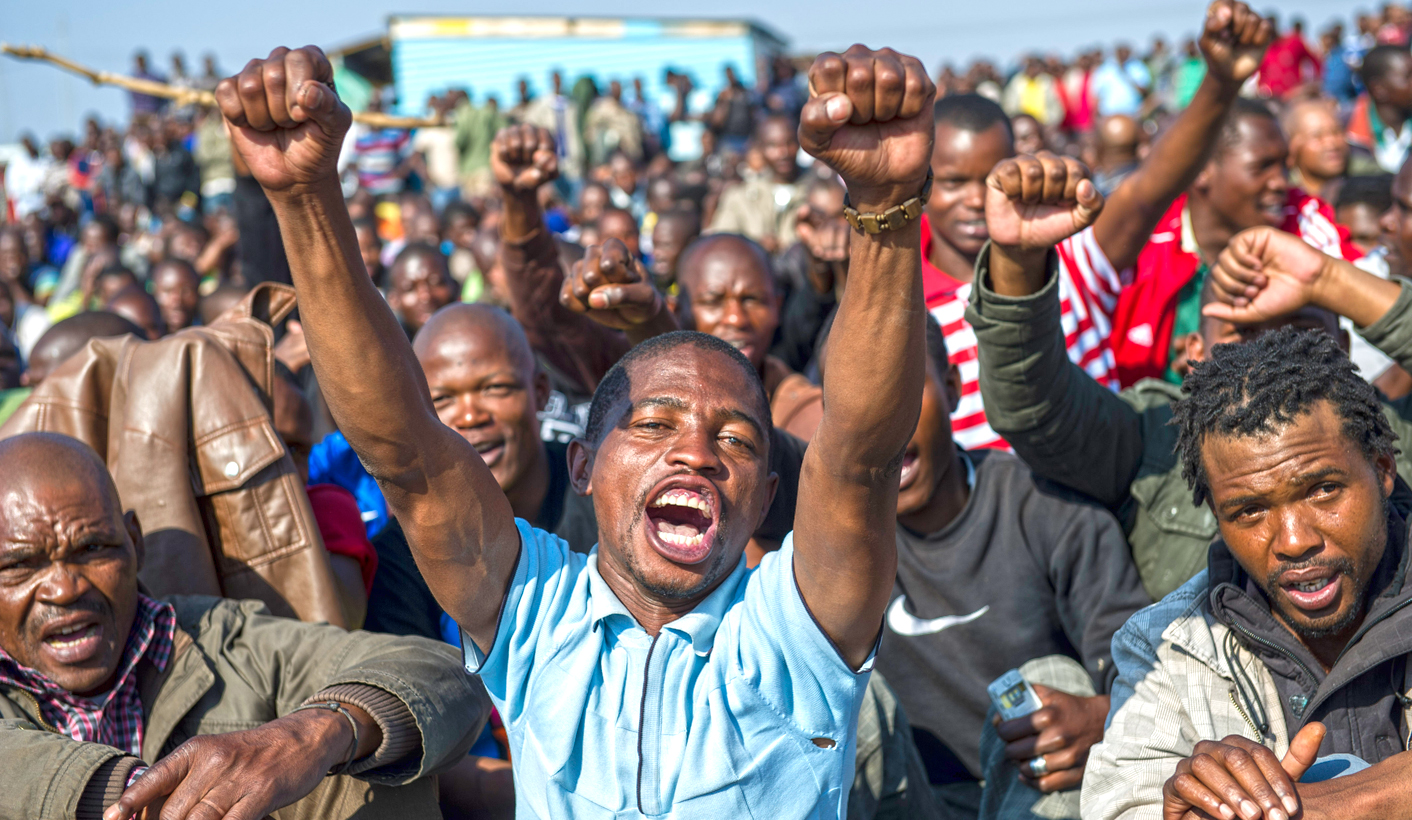The Marikana squatter camp is very quiet in the early morning on Saturday. A few people stroll about, but there is no indication of the carnage that took place just days before. The crime scenes have been cleaned up; the police tape and cones replaced by trailing pieces of paper trash and fresh cow dung.
In the distance, where the large crowd of men had sat in protest for almost a week, the small koppie is now naked. At its base, a handful of police Nyalas (armoured trucks) sit.
We are trying to find the families of the men who have passed away or are jailed. We also want to try and find one of the infamous rock drill operators, the de facto leaders of the illegal strike that saw 45 people dead and about 80 injured. Approaching the passers-by proves to be something of a challenge – we are clearly outsiders and a guard drops over the faces as soon as we approach.
The first few people we approach deliver a stunning piece of news: nobody in the camp actually knows who is dead and who is injured, and so they actually don’t know who the widows in the camp are. The government and the police have yet to provide a roster of names, or a place where relatives can go to identify bodies. All the people know is the names of the men who have not come home. They could be in jail, hospital or the morgue.
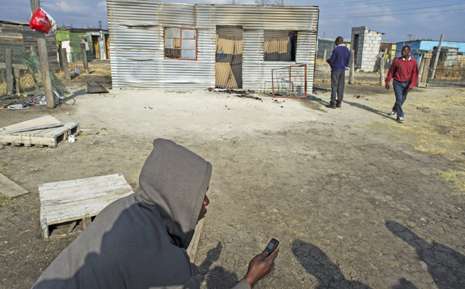
Photo: A miner's shack that some say was burnt down as the owner was suspected of continuing to work at Lonmin during the bitter strike, Wonderkop shanty town. Wonderkop, Marikana, North West Province. August 18, 2012. (Greg Marinovich)
Finding a drill operator also proves to be difficult. We approach the nearest shack and ask to talk to the man standing outside of it, washing out a bucket. He says he isn’t one – he doesn’t even work in the mine, he says – but knows that some live in the camp somewhere. He can’t tell us where. The unease in his demeanour is very plain.
We head deeper into the camp. Everyone we talk to does not go beyond a courteous greeting and a few shakes of the head. Even when we talk to people standing inside a yard, they claim not to live there, but on the other side of the camp.
Somewhere about in the middle of the shacks, while standing in the street, a man approaches us. Xolani* is short, heavy-set and is wearing a taqiyah, the Islamic cap. He ignores an outstretched hand of greeting.
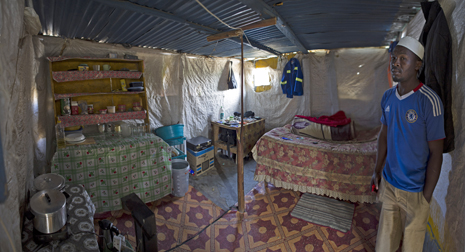
Photo: A rock drill operator who earns just R4,350 a month in his shack at Wonderkop shantytown. Wonderkop, Marikana, North West Province. August 18, 2012. (Greg Marinovich)
“Are you a rock drill operator?” we ask. He nods curtly.
After some minutes of prying, he finally opens up when we ask him what exactly his job entails.
He replies in broken English. Every single day, the drill operators are expected to drill through 30 metres of rock. His allocation is 10 metres every shift. The tunnel is only about 1.3 metres tall, and so he has to squat and point the heavy drill into the rock and hold it as steady as he can as it thumps away (he is squatted down with his arms pointed out straight to demonstrate). He does this for eight hours per shift, in stifling heat, surrounded only by the din of the drill and the occasional presence of a shovel boy who shifts the broken rock that pile at his feet.
“This is a very difficult job. Very difficult. Most people can’t do it. Only the strongest men,” he says.
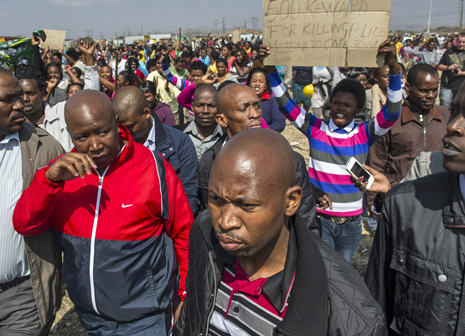
Photo: August 18, 2012. One of the women at Wonderkop holds up a sign behind Julius Malema offering a reward for the killing policemen from Messina to Cape Town. Wonderkop, Marikana, North West Province. Photo Greg Marinovich.
You have to take a number of tests to be a driller, Xolani says. You have to take a physical examination, a heat test (you’re placed in a humid, over-heated room for some time to test your ability to withstand underground conditions) and a skills test. There is a certain amount of knowledge that is expected from you, but the company does not actually provide training for the job, we are told. The only way to learn is to be a shovel boy and steal opportunities to observe an experienced driller at work. Then you have to go take the test. He makes a writing motion with his hand, and then verbally confirms that this is a written test. This used to be a huge handicap, he says, since most drillers couldn’t write. The newer ones have been taught to read and write; the extent of their education.
Is it true that they are only paid R4,500? we ask. He goes into his shack and re-emerges with a payslip. His basic pay for the month is R4,365.90 – add to that a R1,850 housing allowance, benefits and some bonus pay and his gross pay is around R8,124.80. After his union fees, unemployment insurance, other fund contributions and tax, his take-home pay is just over R5,000. This is in a month in which he did quite a bit of overtime, Xolani says.
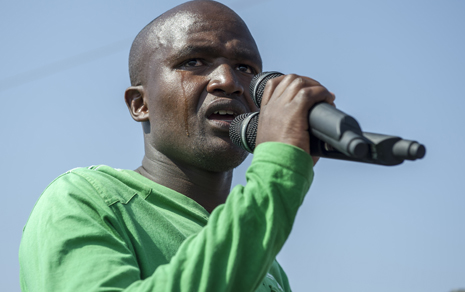
Photo: One of the leaders of the striking Lonmin miners weeps during an impassioned narration of the events that saw several of his fellow leaders killed. Wonderkop, Marikana, North West Province. August 18, 2012. (Greg Marinovich)
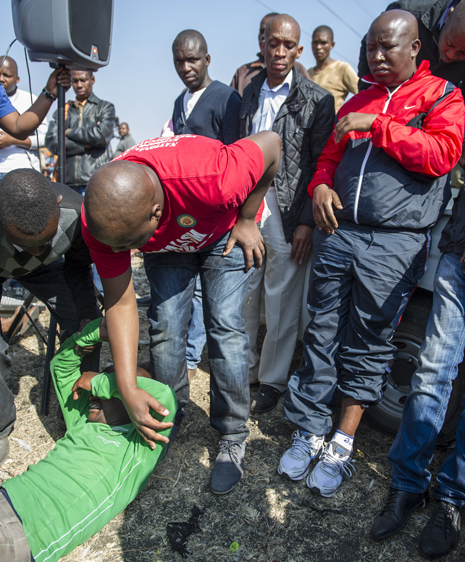
Photo: One of the leaders of the striking Lonmin miners collapses after the speech. Wonderkop, Marikana, North West Province. August 18, 2012. (Greg Marinovich)
“Maybe I send home two or two point three [thousand]. What am I left with? I have to eat with this money, buy clothes and everything. There’s nothing left after that. I can’t put money away. Even small improvements I want to make around the house are impossible. My mother, wife and child all know that I have a job [in] eGoli, but what do I have to show for it? It’s a shame for me. You can work here for years and have nothing at the end. Not even a little scrap car,” Xolani says.
Compare that to the mlungu bosses in the company, we’re told. He takes home hundreds of thousands every month. His housing allowance is R50,000. The last figure may be inflated, but it is impossible to quibble with Xolani under the circumstances of our meeting.
“No, we want that R12,500. Then we will feel like we are earning something. The truth is that this company has platinum because of us. If we did not drill, they would not have it. Why must we work like slaves for nothing?” he asks.
He repeats one phrase repeatedly: sikhathele. They are tired and have had enough.
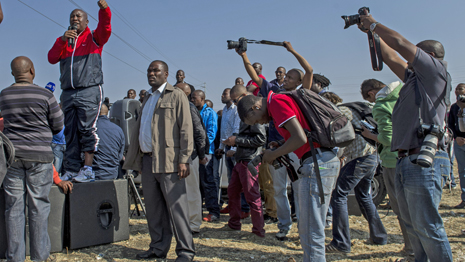
Photo: Julius Malema addresses a large crowd of miners at Wonderkop. Wonderkop, Marikana, North West Province. August 18, 2012. (Greg Marinovich)
Another man walks up to us. He is tall and wiry, and his face and arms are covered in a shocking array of scars. He is also a drill operator and is louder and more militant than his colleague.
“This is our land, yet the white man is killing us underground for fucking little money,” he barks. “We are tired.”
Both men assure us that there is no turning back on their demands.
Out on the street, the mood has changed perceptibly. A handful of people had been watching us talk to the drill operators, and as we walk out of Xolani’s little yard, they begin to approach us and talk freely. It seems that the approval of these two men has made it okay for everyone else to talk to us.
Outside on the street, an older man walks up. He has been working in this mine since 1985, and is now a team leader. It means that he doesn’t handle a drill anymore, but is still down in the hole with the men. The work takes a huge toll on the body, he says. The one thing that always goes is the hearing. He was told that his ears were permanently damaged in 2008 – around the same year that the company finally introduced hearing protection. “It was too late for the old ones,” the team leader says.
His net pay is around R7,000. Of that money, he can only spend half on his needs as he is deeply in debt and spends about R3,500 servicing this every month. It does not require a stretch of imagination to imagine where this could have happened. The small town of Marikana is dotted with the offices of loan sharks.
“We are not going back until we get this money. Sikhathele. Otherwise we could just as well go home and die,” the old man says.
We overhear a conversation about a burned house. A few shacks away, we spot the smouldering remains of a shack. It was apparently torched in the night, just a few hours before we arrived. The man it belonged to is suspected of being a police informant. It isn’t clear what he did exactly, but the evidence against him was his absence when a group came looking for him. The grotesque side of the striking miners is never far away, even as they reel in the face of outrageous police brutality.
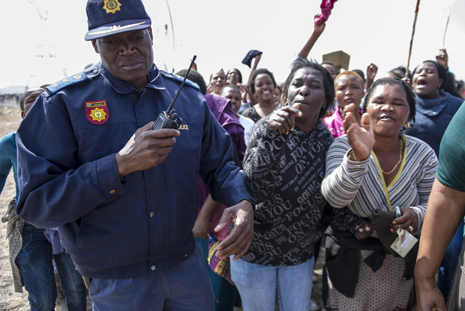
Photo: The wives and relatives of striking Lonmin miners protest against police at the scene of the deaths of some 34 of their colleagues two days previously. Wonderkop, Marikana, North West Province. August 18, 2012. (Greg Marinovich)
As the sun rises higher in the sky, the people start filling the dusty paths and all are convinced that President Jacob Zuma will make an appearance to tell them where to go to find their missing men. They’ve also heard that Julius Malema is coming.
By midday, the number of Nyalas and police has swelled. At the other side of the camp, the men have begun gathering in numbers. The approaching people are immediately sorted by a few men standing at the fringes of the crowd. The men are waved to one side and ordered to remove all earrings, hats, watches and bangles; they must switch their cellphones off. The women are marshalled into another area, and must also remove all ‘Western’ apparel from their heads and arms. Journalists are allowed into the space in the centre and are allowed to keep and use cameras, and cellphones (the latter is used discreetly). Though the atmosphere is tense, there are few weapons visible.
It is impossible to estimate the number of people there as the extent of the crowd is hidden from us. The numbers are surely in the mid-thousands, though.
Finally Malema arrives. Before he speaks, the leaders of various groups get up to speak. They retell the story of what happened in detail. This isn’t because some perhaps don’t know. They’re embedding their version of history into the minds of the crowd, making sure that everyone knows that the police attacked them unprovoked, that the National Union of Mineworkers was a stooge for Lonmin, and that The Association of Mineworkers and Construction Union (AMCU) also failed them. They rage at the absence of political leaders. They call for unity and strength in the face of a tough mountain that they have to climb.
Then Malema gets up to speak. He treads on exactly the same ground as the leaders who spoke before him. The workers at Lonmin are being shot at to protect Cyril Ramaphosa’s profits. The police acted with brutality and massacred innocent people. Jacob Zuma and Nathi Mthethwa, the police minister, have failed and must resign. Malema mentions that he is the only leader who has come to speak to the crowd. He calls for a nationwide solidarity strike. It is vintage Malema: the crowd feels at one with him, and he receives raucous adulation.
After he is done, the crowd disperses quickly. There is no appetite for more fighting, and the police have thankfully given no cause for trouble, but this impasse far from over. The determination to dig heels in until that 300% pay hike is achieved has been galvanised by the meeting.
Zuma does not show up as expected, but perhaps it is just as well. Throughout the day, there was no noise as earth-shaking as when the crowd roared: “Phansi Jacob Zuma, phansi!” DM
*His name has been changed, at his request.
Main photo: Striking Lonmin miners gathered to have a meeting to discuss the deaths of some 34 of their colleagues two days previosly. They were addressed by strike leaders and the expelled African National Congress youth league leader Julius Malema. Malema attacked President Zuma and called for his removal, as well as that of police minister Nathi Mtetwa. Wonderkop, Marikana, North West Province. August 18, 2012. (Greg Marinovich)




